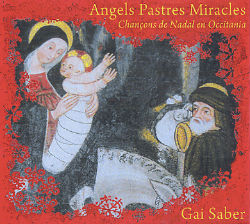The first suggestion is the last release by Occitan band Gai Saber. It's a very rich and skippy album, which merges old-fashioned Christams Carols (all sung in Langue d'Oc!) and "new" sounds influenced by drum'n'bass, dub and "patchanka" music. I know what you're thinking about: that late-Nineties plague of generally left-wing bands which threw some second-hand "traditional" element in a slapdash way into their reggae-infused "combat rock". You'll be probably relieved by the fact that "Angels, pastres, miracles" has nothing to do with that kind of music. It's some sort of new approach to the field and the extraordinary difference is revealed by two simple elements: the richness of the sound (which encompasses hurdy-gurdy, bagpipes, flutes, and electronica besides other acoustic instruments) and its extreme elegance. It's folk music played by folk musicians: that's the point. I'm sure you won't fail to get impressed by its stunning beauty.
"Angels, pastres, miracles" is the fifth album by Gai Saber. All of the other ones are very good, but I specially recommend their masterpiece "Electro Ch'oc" if you like this record.
Here's the review of "Angels, pastres, miracles" I wrote for the website Ondarock.it (in Italian).
Tracklist:
- Patres de Largentiera
- Lou premier miracle
- La camba me fai mau
- Micoulau Nostre Patre
- Venes venes
- San Jauze eme Mario
- Anuech quand lou gau cantavo
- Lou viage di Tres Rei
- Rapataplan
- La Caterineta
- Pastre de la campagno
- Chiara Bosonetto, Rosella Pellerino, Eugenia, Costanza, Antonio Rapa: vocals
- Elena Giordanengo: harp, galobet, vocals
- Maurizia Giordanengo: accordion
- Alex Rapa: acoustic guitar, digital programming, vocals, mandolin
- Simone Lombardo: hurdy-gurdy, hornpipes, flutes
- Lorenzo Arese: drums
- Giorgio Boffa: double-bass
- Massimo Baudino: backing vocals
- Eugenia Rapa: violin
Similar music on the blog:
Calicanto: Venexia (Compagnia Nuove Indye, 1997)
Sinenomine: Spartenza (Incipit Records, 2009)







